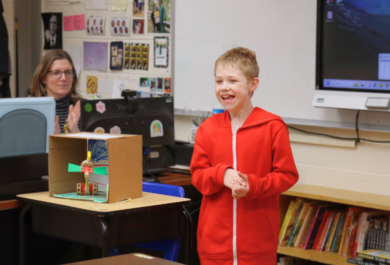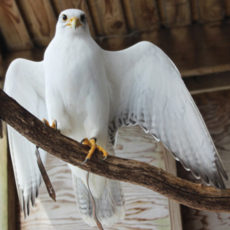Announcements

Green Chimneys School academics are complemented by age-appropriate, therapeutic educational programs offered to all grade levels as part of the weekly class schedule. Many incorporate Green Chimneys’ unique nature-based approach, providing experiential learning and opportunities to develop important skills related to the care of and interaction with animals and plants.
In art class, the creative process is supported through the teaching of artistic skills, color usage, and perspective, and the development of a personal point of view. Safety, discipline and proper tool and material usage characterize the type of class where self-expression is encouraged through the use of various artistic media. Units are designed to familiarize students with well-known artists, art movements and the role of art in society.
The foundation for each unit in the curriculum is to understand animal behavior and the dependence of domesticated animals on humans for their most basic needs and survival and learn to recognize the needs of each living creature. Using an interactive approach, students learn responsible animal stewardship. Farm Science is specifically designed to address the needs of diverse learners through a combination of inquiry-based classroom education, lab, and hands-on activities. The core of this class places an emphasis on Animal-Assisted Activities (AAA) and guided physical and intellectual discovery.
Through effective classroom activities, this course combines functional knowledge and health education social skills. Functional knowledge is presented in the context of potential risks and consequences of various health-related behaviors. Students consider how information and issues impact their own life, as well as the lives of those around them. Health education social skills include decision-making, communication, refusal skills, and relationship and self-management skills, with the goal of achieving health literacy.
An integrated approach to horticulture and gardening connects plants to human health and personal well-being and promotes social and life skills that enhance the personal development of students. The core of the horticulture curriculum revolves around plant anatomy, scientific aspects of plant propagation, the role of plants as human food and the significance of plants to human health and the environment. Students observe and vocationally support the plant life cycle from seed to harvest with a heavy focus on vegetables, herbs, and fruits. During the spring, summer, and fall seasons, the campus organic garden serves as an experiential learning site for this elective; classes move into the campus greenhouse during the winter months.
The Green Chimneys Library provides students with a venue in which they can become proficient in accessing and benefitting from the intellectual property of society through the use of books, magazines, videos, online access of information and other resources as they steer the course of research and inquiry. This course encourages self-expression, the development of interest areas and the use of research materials in support of other school-based courses and projects.
The Life Skills class integrates reading skills, liquid and dry goods measurement, geography, and social studies building on cooperative group skills that model proper etiquette and behavior in food preparation and dining environments. The course encourages sanitation, health, and hygiene, familiarity with culturally diverse foods and healthy eating. Classes are held in a fully functioning teaching kitchen where students gain a working knowledge of the sanitary, safe and effective operation of everyday household appliances such as stoves, mixers, dishwashers and kitchen utensils and learn how to prepare and serve nutritious food in a home-like environment.
Music students learn that performance-based instruction is a productive form of self-expression and communication that can foster group cooperation, individual activity, and outreach. Musical instruments and instruction are provided in class and concepts such as rhythm, musical notes and the structure of music and performance skills are practiced. This self-paced course adapts to the interests and choices of individual students while encouraging group cooperation, peer support and appreciation of individual talent.
The Outdoor Education curriculum is designed to promote creative thinking and a greater understanding of the world to instill a commitment to our individual and community responsibility of stewardship. Students learn and understand the basic ecological, sociological and cultural principles needed to be successful in meeting that commitment. The extensive forests and fields surrounding the campus provide a rich site for studying the human relationship to the environment. Outdoor spaces are explored as an environment for leisure activities such as hiking, kayaking, tower climbing and high ropes adventure. Students are introduced to complex decision-making related to ecological matters such as recycling after carefully weighing the impact of their actions on the environment, culture, and humanity.
The activity goals of Physical Education include coordination, flexibility, stamina, cardiovascular strength, confidence, and enjoyment of physical activity as a life-supporting skill. Course design promotes healthy competition, cooperation and fair play in a team framework, developing communication skills as well as learning to compete against oneself. Note: Students need to have rubber-soled sneakers.
Students develop essential skills in this class, with the goal of functioning effectively in a sophisticated technological and diverse learning and living environment. Through guided exploration, students in this self-paced, highly supervised class learn how to access various computer-based program applications and the internet and increase typing and research skills through educational games and trial-and-error learning. Time spent practicing the usage of technology in the computer lab builds resourcefulness and self-confidence in written expression as skills are mastered. Students may access and continue work on their projects in a variety of settings by logging into their personal files located on the monitored school student server and accessible to students and staff in the Computer Lab, Classroom, and Library.
By taking full advantage of the natural resources at Green Chimneys, the “Natural Connections” wildlife curriculum provides a direct experience with the outdoor environment that teaches stewardship for the environment as a whole. Through guided and unstructured learning, students develop “a sense of place” while exploring the rich local environment and learn that they are connected to other communities by natural systems.

Crowned the best for falconry in medieval times, gyrfalcons were once reserved for kings. As the largest falcon in the world, with exquisite plumage ranging from bright white to deep charcoal, gyrs are revered for their powerful skill of flight. Their long wings make hunting waterfowl from 3,000-feet-high a feasible and fantastical feat. This falcon was flown in the sport of falconry for several years.